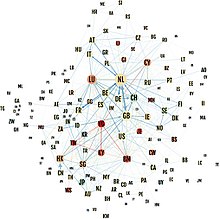Dutch Sandwich
| Part of a series on |
| Taxation |
|---|
 |
| An aspect of fiscal policy |
|

Dutch Sandwich is a base erosion and profit shifting (BEPS) corporate tax tool, used mostly by U.S. multinationals to avoid incurring EU withholding taxes on untaxed profits as they were being moved to non-EU tax havens (such as the Bermuda black hole). These untaxed profits could have originated from within the EU, or from outside the EU, but in most cases were routed to major EU corporate-focused tax havens, such as Ireland and Luxembourg, by the use of other BEPS tools.[1][2] The Dutch Sandwich was often used with Irish BEPS tools such as the Double Irish, the Single Malt and the Capital Allowances for Intangible Assets ("CAIA") tools. In 2010, Ireland changed its tax-code to enable Irish BEPS tools to avoid such withholding taxes without needing a Dutch Sandwich.
Explanation[]
The structure relies on the tax loophole that most EU countries will allow royalty payments be made to other EU countries without incurring withholding taxes. However, the Dutch tax code allows royalty payments to be made to several offshore tax havens (like Bermuda), without incurring Dutch withholding tax.[3]
The Dutch Sandwich therefore behaves like a "backdoor" out of the EU corporate tax system and into un-taxed non-EU offshore locations.[4][5]
These royalty payments require the creation of intellectual property ("IP") licensing schemes, and therefore the Dutch sandwich is limited to specific sectors that are capable of generating substantial IP. This is most common in the technology, pharmaceutical, medical devices and specific industrial (who have patents) sectors.[6]
Its creation is generally attributed to Joop Wijn (State Secretary of Economic Affairs in May 2003) after lobbying from U.S. tax lawyers from 2003 to 2006.[7][8]
[When] former venture-capital executive at ABN Amro Holding NV Joop Wijn becomes State Secretary of Economic Affairs in May 2003 [, ... it's] not long before the Wall Street Journal reports about his tour of the US, during which he pitches the new Netherlands tax policy to dozens of American tax lawyers, accountants, and corporate tax directors. In July 2005, he decides to abolish the provision that was meant to prevent tax dodging by American companies, in order to meet criticism from tax consultants.
Impact[]
As of 2020, "The Netherlands is an extremely attractive jurisdiction in which to locate a royalty conduit companies",[9] although a withholding tax on royalties was announced for 2021 "for cases where abuse is involved"[10] after international pressure.
As of 2016, "Multinationals moved some €22bn in royalties and interest through the Netherlands in 2016 in order to avoid tax, according to a new report for the finance ministry". Usage of this tax avoidance structure, alone, produced 10 % of the income reported by shell companies in the Netherlands.[11]
Double Irish[]

The Dutch Sandwich is most commonly associated with the double Irish BEPS tax structure,[1][2] and Irish-based US technology multinationals such as Google.[12][13] The Double Irish is the largest BEPS tool in history, helping mostly US technology and life sciences multinationals shield up to US$100 billion per annum from taxation.
The Double Irish uses an Irish company (IRL2) that is legally incorporated in Ireland, and thus the US-tax code regards it as foreign, but is "managed and controlled" from, say, Bermuda (and thus the Irish tax code also regards it as foreign). The Dutch Sandwich, with the Dutch company as the "dutch slice" in the "sandwich", is used to move money to this Irish company (IRL2), without incurring Irish withholding tax.[14]
In 2013, Bloomberg reported that lobbying by PricewaterhouseCoopers Irish Managing Partner Feargal O'Rourke,[15] who Bloomberg labelled "grand architect" of the Double Irish,[16][17] led to the Irish Government to relax the rules for making Irish royalty payments to non-EU companies (i.e. IRL2), without incurring Irish withholding tax. This removed the explicit need for the Dutch Sandwich, but there are still several conditions that will not suit all types of Double Irish structures, and thus several US multinationals in Ireland continued with the classic "Double Irish with a Dutch Sandwich" combination.[18][19][20][12]
After pressure from the EU,[21] the Double Irish BEPS tool was closed to new users in 2015,[citation needed] however, new Irish BEPS tools were created to replace it:[22][23]
- Apple's and Accenture's Capital Allowances for Intangible Assets (CAIA) Irish BEPS tool (made famous by leprechaun economics).[26][27][28]
Conduit OFC[]

The Dutch Sandwich has made Netherlands the largest of the top five global Conduit OFCs identified in a 2017 analysis published by Nature Research of offshore financial centres titled: "Uncovering Offshore Financial Centers: Conduits and Sinks in the Global Corporate Ownership Network".[29][30][31] The five global Conduit OFCs (Netherlands, United Kingdom, Ireland, Singapore, and Switzerland) are countries not formally labeled "tax havens" by the EU/OCED, however, they are responsible for routing almost half the flows global corporate tax avoidance to the twenty-four Sink OFCs, without incurring tax in the Conduit OFC.
Conduit OFCs rely on major offices of large law and accounting firms to create legal vehicles, where as Sink OFCs have smaller operations (e.g. branches of these larger firms).[4] For example, Ireland has the BEPS tools to enable US IP-heavy multinationals to reroute global profits into Ireland, tax-free. The Netherlands then enables these Irish profits to get to a classical tax haven (e.g. the Cayman Islands or Jersey) without incurring EU withholding tax.[29]
See also[]
- Tax exporting
- Tax inversion
- Tax haven
- Conduit and Sink OFCs
- Bermuda Black Hole
- Irish Financial Services Centre
- Feargal O'Rourke
References[]
- ^ a b "'Double Irish' with a 'Dutch Sandwich'". New York Times. 28 April 2012.
- ^ a b "IMF explains "Double Irish Dutch Sandwich" tax avoidance". FinFacts. 11 October 2013.
- ^ "Double Irish Dutch Sandwich". Timothy Taylor. 16 July 2014.
- ^ a b "After a Tax Crackdown, Apple Found a New Shelter for Its Profits". New York Times. 6 November 2017.
- ^ "No more "Dutch Sandwich"? The Netherlands reviews its role in tax avoidance". arstechnia. 24 January 2013.
- ^ "The Corporate Tax Avoidance Toolbox". B&R Beurs. 2018. Archived from the original on 2018-06-16. Retrieved 2018-05-01.
- ^ a b "DE CORRESPONDENT REVEALS HOW THE NETHERLANDS BECAME TAX HAVEN". Oxfam/De Correspondant. May 2017.
- ^ a b "Zo werd Nederland het grootste belastingparadijs voor Amerikaanse multinationals". De Correspondant. 1 June 2017.
- ^ "Lowtax - Global Tax & Business Portal | Types of Company - Royalty Conduit Companies". www.lowtax.net. Retrieved 2020-02-28.
- ^ "Deloitte highlights on international taxation 2019" (PDF). 2019.
- ^ "Multinationals avoid tax on €22bn in royalties and interest: report - DutchNews.nl". DutchNews.nl. 2018-11-07. Retrieved 2020-02-28.
- ^ a b "'Double Irish' and 'Dutch Sandwich' saved Google $3.7bn in tax in 2016". Irish Times. 2 January 2018.
- ^ "Google's 'Dutch Sandwich' Shielded 16 Billion Euros From Tax". Bloomberg. 2 January 2018.
- ^ ‘Double Irish With a Dutch Sandwich’
- ^ "Scion of a prominent political dynasty who gave his vote to accountancy". Irish Times. 8 May 2015.
- ^ "Man Making Ireland Tax Avoidance Hub Proves Local Hero". Bloomberg News. 28 October 2013.
- ^ "Controversial tax strategies brainchild of O'Rourke's son". Irish Independent. 3 November 2013.
- ^ "Treatment of Certain Patent Royalties Paid to Companies Resident Outside the State (e-brief 55/10)". Irish Revenue. June 2010.
- ^ "Ireland Expands Withholding Tax Exemption On Royalties". Mason Hayes Curran Law Firm. August 2010.
- ^ "Withhold No More - Outbound Patent Royalties Can Be Paid Gross". Matheson. June 2011.
- ^ "Brussels in crackdown on 'double Irish' tax loophole". Financial Times. October 2014.
- ^ "Multinationals replacing 'Double Irish' with new tax avoidance scheme". The Irish Independent. 9 November 2014.
- ^ "Death of the "Double Irish Dutch Sandwich"? Not so Fast". Taxes Without Borders. 23 October 2014. Archived from the original on 22 March 2018. Retrieved 27 April 2018.
- ^ "'Impossible' structures: tax outcomes overlooked by the 2015 tax Spillover analysis" (PDF). Christian Aid. November 2017.
- ^ "Multinationals replacing 'Double Irish' with new tax avoidance scheme". RTE News. 14 November 2017.
- ^ "What Apple did next". Seamus Coffey, University College Cork. 24 January 2014.
- ^ "Tax Avoidance and the Irish Balance of Payments". Council on Foreign Relations. 25 April 2018.
- ^ "Firm gets tax relief on $7bn rights: Accenture". Irish Examiner. 24 January 2012.
- ^ a b Garcia-Bernardo, Javier; Fichtner, Jan; Takes, Frank W.; Heemskerk, Eelke M. (24 July 2017). "Uncovering Offshore Financial Centers: Conduits and Sinks in the Global Corporate Ownership Network". Scientific Reports. Nature Magazine. 7 (1): 6246. arXiv:1703.03016. Bibcode:2017NatSR...7.6246G. doi:10.1038/s41598-017-06322-9. PMC 5524793. PMID 28740120.
- ^ "Netherlands, not Bermuda, is the tax evasion capital of the world". Compliance Week. 30 July 2017. Archived from the original on 3 April 2018. Retrieved 24 April 2018.
- ^ "The Netherlands is the world's biggest conduit to offshore tax havens: research". Dutch News NL. 24 July 2017.
External links[]
- ABC (Australia) What is a Double Irish with a Dutch Sandwich? (September 2016)
- International taxation
- Tax avoidance
- Corporate tax avoidance
- Global issues